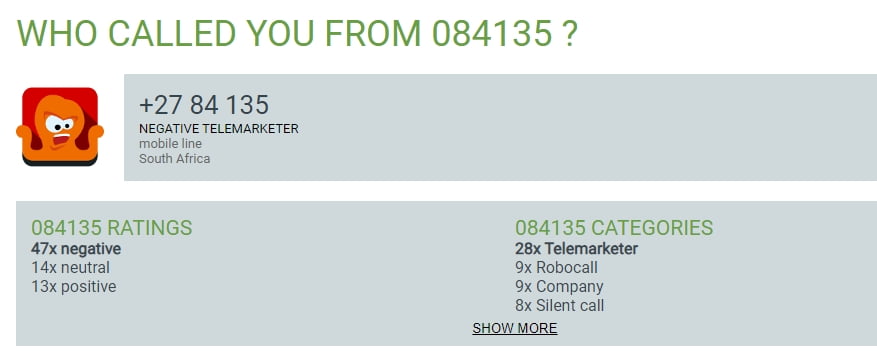Phone calls are a popular means of communication, but they can also be a source of frustration and anxiety.
With an increasing number of unsolicited and unknown calls, it’s no wonder that many South Africans are now searching for ways to know who phoned them.
Identifying the origin of a call, whether from a known or unknown number, is essential for maintaining privacy, avoiding scams, and ensuring peace of mind.
Table of Contents
- The Growing Concern of Unknown Callers in South Africa
- Why Do People Want to Know Who Called Them?
- Tools and Techniques to Identify Unknown Callers
- Common Types of Calls in South Africa
- How to Protect Yourself from Unwanted Calls
- Legislation and Regulations on Unsolicited Calls in South Africa
- The Future of Caller Identification in South Africa
- Conclusion
The Growing Concern of Unknown Callers in South Africa
South Africa, like many other countries, faces the challenge of unknown and unsolicited calls. These can range from telemarketers, scam artists, or even well-intentioned but unknown contacts. The irritation of receiving these calls is compounded by the uncertainty of not knowing the caller’s identity, leading to the rise of services and techniques to answer the burning question: “Who phoned me in South Africa?”
Why Do People Want to Know Who Called Them?
The motivation behind finding out who called you stems from various concerns:
- Privacy: Protecting personal information and avoiding unwelcome contacts.
- Safety: Safeguarding oneself from potential scams and fraud.
- Curiosity: Simply wanting to know who tried to reach you.
- Professional Reasons: In a business context, missed calls could mean missed opportunities.
The importance of identifying unknown callers cannot be overstated, especially in a country where scam calls are on the rise.
Tools and Techniques to Identify Unknown Callers
Thankfully, technology offers several tools and techniques to identify who phoned you. Here are some of the most effective methods available in South Africa.
Reverse Phone Lookup Services
Reverse phone lookup services are designed to provide the identity of the caller based on their phone number. Several platforms allow South African users to enter a phone number and receive information about the caller. Popular services include:
- Truecaller: Widely used in South Africa, Truecaller has a large database of numbers, making it possible to identify callers quickly.
- Phonebook South Africa: A local service that offers reverse phone lookup specifically tailored for South African numbers.
- Sync.ME: Another global service that also works effectively in South Africa, providing details about unknown callers.
Mobile Applications
In addition to reverse lookup websites, there are several mobile applications that South Africans can use to identify unknown callers. These apps not only provide caller identification but also offer features like call blocking and spam detection.
- Hiya: A robust app that not only identifies unknown callers but also offers features to block spam calls.
- Whoscall: This app has a vast database and is effective in identifying both local and international numbers.
- Mr. Number: A popular choice for blocking and reporting unwanted calls.
Telecommunications Providers
South African telecom providers also offer services to help identify unknown callers. For example, Vodacom, MTN, and Telkom provide options for users to report and block numbers directly through their network services. These providers often collaborate with third-party services to enhance caller identification.
Online Communities and Forums

Online communities can be surprisingly effective in helping identify unknown numbers. Websites like “Should I Answer” where you can search for the number that called you from a large database of questions asked by other members, if you can’t find it you can ask and the members are always ready to help out if they know. The Reddit forum r/SouthAfrica often has threads where users share experiences and information about unknown callers, contributing to a collective database.
Social Media and Search Engines
A simple search on Google or social media platforms like Facebook and LinkedIn can sometimes yield surprising results. By entering the phone number in the search bar, users might find associated profiles or posts that help identify the caller.
Common Types of Calls in South Africa
Understanding the common types of calls South Africans receive can help in identifying unknown callers. The majority of unsolicited calls fall into the following categories:
Telemarketing Calls
These are perhaps the most common type of unsolicited calls. Telemarketers aim to sell products or services, and while some may be legitimate, others can be persistent and invasive.
Scam Calls
Scam calls are a growing concern in South Africa. Scammers use various tactics to extract personal information or money from unsuspecting individuals. Common scams include:
- Phishing Scams: Where the caller pretends to be from a reputable organization to steal your information.
- Prize Scams: Claiming that you’ve won a prize but need to provide details or pay a fee to claim it.
- Tech Support Scams: Impersonating tech support to gain access to your computer or personal information.
Survey and Research Calls
These calls are usually from organizations conducting surveys or research. While they may be legitimate, they can still be intrusive, especially if you haven’t opted in.
Debt Collection Calls
Debt collectors often use phone calls to contact individuals. If you’re unsure about the legitimacy of the call, it’s crucial to verify the caller’s identity before sharing any information.
How to Protect Yourself from Unwanted Calls
Preventing unwanted calls is just as important as identifying them. Here are some strategies to protect yourself:
Register with the National Do Not Call List
South Africa has a National Do Not Call Register where you can list your number to avoid unsolicited marketing calls. While this won’t block all unwanted calls, it can significantly reduce them.
Use Call Blocking Features
Most smartphones today come with built-in call-blocking features. You can block numbers directly through your phone settings or use third-party apps for enhanced functionality.
Report Suspicious Numbers
If you receive a call from a suspicious number, report it to your telecommunications provider or a relevant authority. Many apps, like Truecaller, allow users to report numbers, helping to build a database of spam and scam numbers.
Be Cautious with Personal Information
Never share personal or financial information over the phone unless you are certain of the caller’s identity. Scammers often use social engineering tactics to make their calls appear legitimate.
Legislation and Regulations on Unsolicited Calls in South Africa
South Africa has specific laws and regulations aimed at protecting consumers from unsolicited calls. Understanding these can help you take action against unwanted callers.
Protection of Personal Information Act (POPIA)
POPIA is South Africa’s data protection law that regulates how personal information is processed. Under POPIA, organizations must obtain your consent before making marketing calls. Violations of this law can be reported to the Information Regulator.
Consumer Protection Act (CPA)
The CPA also provides protection against unsolicited marketing. It gives consumers the right to opt out of direct marketing communications, including phone calls.
Enforcement and Penalties
Companies that violate these laws can face significant penalties. Consumers can report violations to the National Consumer Commission or the Information Regulator, depending on the nature of the complaint.
The Future of Caller Identification in South Africa
As technology evolves, so too does the ability to identify unknown callers. Innovations in artificial intelligence, machine learning, and big data are paving the way for more accurate and comprehensive caller identification systems.
Artificial Intelligence and Machine Learning
AI and machine learning are being integrated into caller identification apps, improving their ability to recognize and block spam calls. These technologies analyze patterns and behaviors to distinguish between legitimate and unwanted calls.
Enhanced Privacy Features
Future developments may also focus on enhancing user privacy. This could include more stringent data protection measures and the ability to identify calls without sharing personal information.
Collaborations Between Telecom Providers and Tech Companies
We can expect to see more collaborations between telecom providers and technology companies to improve caller identification services. These partnerships aim to create a seamless experience for users, combining the strengths of both sectors.
Conclusion
The need to identify “Who phoned me in South Africa” reflects a broader concern with privacy, security, and peace of mind. By utilizing available tools, understanding the common types of calls, and staying informed about legal protections, South Africans can take control of their phone calls and protect themselves from unwanted intrusions.
FAQs
How can I identify an unknown caller in South Africa?
You can use reverse phone lookup services, mobile apps like Truecaller, or even search the number online to identify an unknown caller in South Africa.
What should I do if I receive a suspicious call?
If you receive a suspicious call, avoid sharing any personal information, and report the number to your telecom provider or relevant authorities.
Is it legal for companies to make unsolicited marketing calls in South Africa?
Under the Protection of Personal Information Act (POPIA), companies must obtain your consent before making unsolicited marketing calls.
What are common types of scam calls in South Africa?
Common scam calls in South Africa include phishing scams, prize scams, and tech support scams.
Can I block unwanted calls on my smartphone?
Yes, most smartphones have built-in call blocking features, and there are also third-party apps available for enhanced call blocking.
Is there a way to reduce telemarketing calls in South Africa?
You can register your number on South Africa’s National Do Not Call List to reduce telemarketing calls.
Inbound Links:
Consider linking to articles on consumer protection in South Africa or how to report spam calls.
Outbound Links:
Link to the official National Consumer Commission and Information Regulator websites for more information on reporting unwanted calls and privacy rights.


